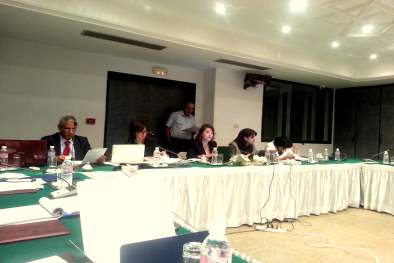The workshop was held in the framework of the SITWA project (“Strengthening Institutions for Transboundary Water Management in Africa”), launched by the EU in 2012 to reinforce cooperation on transboundary water basins and the development of a holistic approach for water management.
The first draft of the strategic framework was discussed during ANBO’s[1] Coordination Bureau meeting in Abuja on 16 April 2014. The second draft was discussed at SITWA’s Steering Committee meeting in Dakar on 29 May 2014. A participatory process was launched to support elaboration of the strategy and its related action plan via regional consultations in the five African regions. The strategy and the action plan will be ultimately presented to ANBO’s General Assembly before November 2014.
The draft strategy is structured around four strategic areas: i) strengthening ANBO’s institutional, technical, knowledge-sharing and resources mobilisation capacity; ii) strengthening the institutional framework of basin organisations’ resources, iii) strengthening basin organisations’ planning capacity, resources mobilisation and implementation capacity, iv) strengthening the capacity of basin organisations to manage data, information and knowledge.
The workshop of 11 September 2014 in Tunis was organised as the regional consultation for North Africa, to take into consideration the specific regional characteristics, and then identify and recommend priority actions for ANBO with regards to a) strengthening the institutional, planning, resources mobilisation, implementation, technical, knowledge-sharing, as well as data and information managing capacity of basin organisations with existing cooperation mechanisms, and b) promoting the establishment of such mechanisms in the case of basin organisations that currently lack them. A further workshop objective was the harmonisation of national policies on Integrated Water Resources Management.
The workshop was attended by 15 participants, among which representatives of river basin organisations, as well as of the ministries competent for water resources management and protection in North Africa, members of the Technical Advisory Committee of the African Ministers’ Council on Water, representatives of the regional economic commission for North Africa, the Arab Maghreb Union, representatives of regional and international organisations, as well as experts involved in the management and protection of transboundary freshwater resources in North Africa. The draft strategy and a questionnaire were shared with all participants prior to the workshop. The participants’ preliminary feedback to the questionnaire provided the basis for the plenary discussions that were divided into an introductory session, a session focusing on ANBO’s strategy with regards to strengthening already existing mechanisms, and one focusing on ANBO’s approaching of organisations with complete lack of relevant mechanisms. The workshop was organised by the Global Water Partnership - Mediterranean (GWP-Med) in collaboration with WaterLex and the Platform for International Water Law at the University of Geneva’s Faculty of Law.
Due to North Africa’s arid and semi-arid climate and the deriving natural instability caused by the insufficient rainfall, warm temperatures, the year-to-year irregularities of rainy periods and the more or less lengthy drought cycles, the region’s nations are facing severe natural constraints affecting their access to shared water resources. The water scarcity is aggravated by human-induced phenomena such as climate change, population growth, urbanisation, increased use of water resources to meet food demands and changes in territorial management.
In this context, the collaborative management and protection of shared water resources is a significant issue in the relationships between the region’s States. It is believed to be advancing the socio-economic development of African populations by taking into account local knowledge. North African States have demonstrated their willingness to establish joint mechanisms on some water basins, focusing primarily on exchanging and sharing information[2]. Several other transboundary watercourses, however, lack mechanisms for institutional cooperation, such as the Medjerda River shared by Algeria and Tunisia.
The completed regional consultation in Tunis is considered as successful, having reached its objectives. The active interest of the participants highlighted the importance attributed to cooperation, as an instrument of efficient water resources management in North Africa. The participants stressed their hope that the ANBO can contribute to the strengthening of regional cooperation, taking into account the identified needs and implementing the recommended actions. It was judged that the successful integration of this workshop’s recommendations into the strategy and the action planning of the ANBO will help it position itself as a key actor of the cooperation on shared water resources in North Africa. The need to tighten relations between different actors, such as government authorities, private sector, non-governmental organisations, research institutes etc., in order to reach a common vision on shared water resources was finally pointed out.
You can find here the workshop’s Agenda (EN) (FR) and Concept Note (EN) (FR) , as well as the Questionnaire (EN) (FR) distributed prior to the workshop.
[1] The ANBO was created in 2002 to respond to the need of coordination and strengthening cooperation between African organisations managing rivers, lakes and aquifers. It aims to bring together these organisations in a single representative body, according to the guidelines of the African Ministers’ Council on Water (AMCOW), which coordinates water policies within the African Union’s New Partnership for Africa's Development (NEPAD). The ANBO provides a conceptual framework for continent-wide water resources management and protection policies, as well as short and middle-term strategies. ANBO constitutes thus an important means towards assisting regional institutional mechanisms to meet best practice standards, both in Africa and other regions.
[2] Such examples are the Consultation Mechanism for the North-Western Sahara Aquifer System (SASS) established in 2002 by Algeria, Libya and Tunisia, with the support of the Sahara and Sahel Observatory (OSS), or the Terms of Reference For the Monitoring and Exchange of Groundwater Information of the Nubian Sandstone Aquifer System, adopted by Chad, Egypt, Libya and Sudan in 2000.
